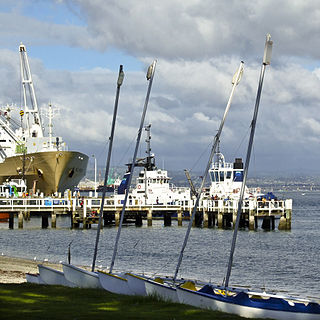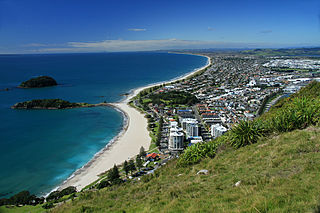Related Research Articles

The Values Party was a New Zealand political party. It is considered the world's first national-level environmentalist party, pre-dating the use of "Green" as a political label. It was established in May 1972 at Victoria University of Wellington. Its first leader was Tony Brunt, and Geoff Neill, the party's candidate in the Dunedin North electorate, became the Deputy Leader.

Hugh Richmond Lloyd Morrison was a Wellington, New Zealand-based investment banker and entrepreneur. He founded H.R.L. Morrison & Co in 1988, and Morrison & Co launched the infrastructure company Infratil in 1994.

Bay of Plenty is a New Zealand electoral division returning one member to the New Zealand House of Representatives. The current representative is Todd Muller of the National Party, first elected at the 2014 election. He replaced Tony Ryall, also of the National Party, who retired after representing the seat since 1996.

Rotorua is a New Zealand parliamentary electorate, returning one Member of Parliament to the New Zealand House of Representatives. It was first established in 1919, and has existed continuously since 1954. The current MP for Rotorua is Todd McClay of the National Party, who won the electorate in the 2008 general election from incumbent Labour MP Steve Chadwick.

Tauranga is a New Zealand parliamentary electorate, returning one Member of Parliament to the New Zealand House of Representatives. The current MP for Tauranga is Sam Uffindell of the National Party, who won the seat in the 2022 Tauranga by-election, following the resignation of the previous MP, Simon Bridges of the National Party.

The Port of Tauranga is situated in Tauranga, New Zealand. It is the largest port in the country both in terms of total cargo volume, and in terms of container throughput with container volumes exceeding 1.2 million TEUs. The port is operated by Port of Tauranga Ltd. This article is about both the company and the port itself.

State Highway 2 runs north–south through eastern parts of the North Island of New Zealand from the outskirts of Auckland to Wellington. It runs through Tauranga, Gisborne, Napier, Hastings and Masterton. It is the second-longest highway in the North Island, after State Highway 1, which runs the length of both of the country's main islands.
Kaimai is a former New Zealand parliamentary electorate, from 1978 to 1996. In 1996 the MP Robert Anderson was selected for the new seat of Coromandel, but retired due to illness, and was replaced by Murray McLean, who won the new seat.

Tauranga City Council is the local government authority for Tauranga City in New Zealand. It is a territorial authority elected to represent the 158,000 people of Tauranga. The last Mayor of Tauranga was Tenby Powell, who resigned in November 2020. The council consists of 11 members elected from three wards and at-large, and is presided over by the Mayor, who is elected at large. Marty Grenfell is currently the CEO of Tauranga City Council.
Hastings was a parliamentary electorate in the Hawke's Bay Region of New Zealand from 1946 to 1996. The electorate was represented by nine Members of Parliament. The Hastings electorate was a typical bellwether electorate, frequently changing between the two main parties.

William Kelly was an Irish migrant to New Zealand, and became a businessman, soldier and politician.
The Mount Maunganui branch is a short industrial branch line in Tauranga, New Zealand, servicing the eastern side of the Port of Tauranga. It branches from the East Coast Main Trunk at a triangle junction outside Baypark Stadium before running north-west through Mount Maunganui to the port complex.

Tauranga is a coastal city in the Bay of Plenty Region and the fifth-most populous city of New Zealand, with an urban population of 161,800, or roughly 3% of the national population. It was settled by Māori late in the 13th century, colonised by Europeans in the early 19th century, and was constituted as a city in 1963.
Dame Mary Josephine Drayton, known as Joy Drayton, was a New Zealand teacher, academic and officeholder.
Sir Robert Arthur Owens was a New Zealand businessman and local politician. He served as mayor of both Tauranga and the nearby Mount Maunganui in the Bay of Plenty. He later moved from Mount Maunganui to Auckland. He was knighted in 1997.
The 2006 New Year Honours in New Zealand were appointments by Elizabeth II in her right as Queen of New Zealand, on the advice of the New Zealand government, to various orders and honours to reward and highlight good works by New Zealanders, and to celebrate the passing of 2005 and the beginning of 2006. They were announced on 31 December 2005.

SS Go Ahead was a twin screw-steamer, launched on the afternoon of Saturday 20 April 1867 by Seath and Connell, of Rutherglen, for the Clyde Shipping Company, with a plan to use her in New Zealand coastal trading. She had 30, or 35 hp (26 kW), high pressure engines, and tubular boilers from Campbell & Son's foundry.

George William Bryant is a New Zealand writer, politician and theologian. He was a councillor for Whangarei District Council for six years during the 1980s and twice stood in parliamentary elections for Social Credit.
Tanya Jane Dearns is a New Zealand netball coach and former netball player. She played 31 international matches for the New Zealand team between 1990 and 1998, including at the 1991 World Netball Championships.
The New Zealand Liberal Federation was a laissez-faire Liberal Party that was formed to stand electoral candidates in the mid-1950s.
References
- Norton, Clifford (1988). New Zealand Parliamentary Election Results 1946–1987: Occasional Publications No 1, Department of Political Science. Wellington: Victoria University of Wellington. ISBN 0-475-11200-8.